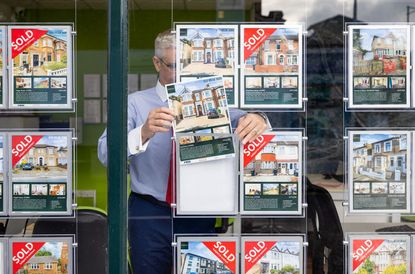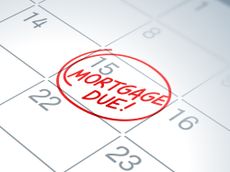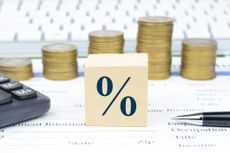House prices fall at the fastest rate since 2008
The fallout from mini-Budget blamed for the biggest monthly house prices fall in 14 years


Average UK house prices fall in November by 2.3%, the largest monthly drop since 2008.
That’s according to the latest house price index from Halifax, and represents three straight months of house price falls.
It means that the average property now costs £285,579, down from the £292,406 registered in October.
Looking at the annual rate of growth, there has also been a steep fall. According to Halifax, annual house price growth now stands at 4.7%, compared with 8.2% in October.
The Halifax study follows a rival house price index from Nationwide Building Society, published this week, which found that prices dropped 1.4% month-on-month in November. According to Nationwide’s data, that was the biggest fall in two years.
The steep drop in house prices has been blamed on rising interest rates on mortgages, sparked by the disastrous mini-budget from former Prime Minister Liz Truss and her Chancellor Kwasi Kwarteng.
House prices fall 2.3%
Where are house prices rising and falling the fastest?
There are regional variations when it comes to house price changes. For example, the North East of England actually saw its annual growth rate increase slightly in November to 10.5%, from 10.4% the month before. As a result it is now the only area of the UK with annual house price inflation in double figures.
Look After My Bills Newsletter
Get the best money-saving tips, tricks and deals sent straight to your inbox every week. Make sense of your money in partnership with The Money Edit.
By contrast, Wales and the South West have seen the sharpest slowing in annual growth, from 11.5% to 7.9%, and from 10.7% to 8.4% respectively.
Halifax notes that both areas had been “key hotspots” for house price inflation during the pandemic as househunters prioritised factors like space and the opportunity to live in rural areas.
Annual house price growth in Scotland has slowed from 7.4% to 6.5% over the month, while in Northern Ireland is has dipped from 9.7% to 9.1%.
London continues to lag behind other UK regions, with price growth at 5.2%, down from 6.6% in October. Despite this it is still the most expensive place in which to buy a property in the UK, with average prices of £549,160.
Why are house prices falling?
The latest fall reflects the “worst of the market volatility” seen in recent months, says Kim Kinnaird, director of Halifax Mortgages.
Kinnaird suggests that would-be homebuyers have paused potential moves as they feel increased pressure on their household finances, and pointed to industry data which “continues to suggest that many buyers and sellers are taking stock while the market continues to stabilise”.
The aftermath of the mini-budget saw lenders across the market withdraw their mortgage product ranges, and reprice them at much higher rates. While interest rates are starting to drop now, they are generally substantially more expensive than just a couple of months ago.
Combined with inflation reaching the highest level in four decades, buying a home is simply no longer affordable for some.
As Karen Noye, mortgage expert at adviser Quilter puts it: “Increased rates, sky high inflation and general uncertainty will quickly put lots of potential first time buyers and movers off, reducing demand and house prices with it.”
What will happen next with house prices?
Looking forward, Kinnaird says it is important to bear in mind the incredible house price growth of the last few years. She notes that house prices today are up by more than £12,000 on average, in cash terms, than a year ago and more than £46,000 above pre-pandemic levels.
Kinnaird adds: “While some important factors like the limited supply of properties for sale will remain, the trajectory of mortgage rates, the robustness of household finances in the face of the rising cost of living, and how the economy – and more specifically the labour market – performs will be key in determining house prices changes in 2023.”
This is echoed by Noye, who points to forecasts for inflation to start to ease next year, adding that if interest rates drop then “house prices are unlikely to be in decline for too long”.
“There is simply not enough stock on the market and people cannot put their life on pause forever,” she adds.
Despite this, it’s widely expected that house prices will continue to fall in the short term. The Office for Budget Responsibility for example has predicted that house prices will drop by 9% over the next two years, while estate agents Savills and Knight Frank have forecast falls of 10% and 5% next year respectively.

John Fitzsimons has been writing about finance since 2007, and is a former editor of Mortgage Solutions and loveMONEY. Since going freelance in 2016 he has written for publications including The Sunday Times, The Mirror, The Sun, The Daily Mail and Forbes, and is committed to helping readers make more informed decisions about their money.
-
 Three energy firms pay £8m in switching compensation - has your provider paid out?
Three energy firms pay £8m in switching compensation - has your provider paid out?More than 100,000 customers have received compensation after changing providers, but is now a good time to switch energy suppliers?
By Tom Higgins Published
-
 Save £300 on your supermarket shop with cashback accounts
Save £300 on your supermarket shop with cashback accountsBanks, credit card companies and cashback sites are all offering cashback on your supermarket shop, but can you use them all to max out your savings?
By Vaishali Varu Published
-
 Moving home: why failing to share your new address could cost you money
Moving home: why failing to share your new address could cost you moneyWhen you move home you’ll want to share your new address with family and friends – but being slow to update your contact details with councils, banks and the DVLA can be costly
By Sue Hayward Published
-
 Skipton Building Society to offer deposit-free mortgages for “trapped renters” - everything you need to know about 100% deals
Skipton Building Society to offer deposit-free mortgages for “trapped renters” - everything you need to know about 100% dealsEverything you need to know about how to get a mortgage with no deposit
By Katie Binns Published
-
 Stamp duty: are you entitled to a tax refund worth thousands?
Stamp duty: are you entitled to a tax refund worth thousands?There are plenty of reasons why homebuyers may be entitled to a stamp duty refund, but it’s important to only claim if you’re eligible for a refund (and beware the claims management companies)
By John Fitzsimons Published
-
 House price hotspots: 50 areas where property prices have shot up the most
House price hotspots: 50 areas where property prices have shot up the mostWhich areas have seen the strongest house price growth over the past decade? Discover the towns and locations around the UK where property prices have more than doubled.
By John Fitzsimons Published
-
 Faster mortgage support for Universal Credit claimants – what it means for you
Faster mortgage support for Universal Credit claimants – what it means for youIf you claim Universal Credit, you can now get quicker support with paying your mortgage. We look at when you can get it and how to access it
By Stephanie Baxter Published
-
 Should I fix my mortgage rate?
Should I fix my mortgage rate?Interest rates are expected to rise again on the back of stubborn inflation, before falling next year. We look at the pros and cons of fixing your mortgage rate and what to consider if you need to remortgage soon.
By Stephanie Baxter Last updated
-
 Selling your home: avoid these mistakes to get the best possible price
Selling your home: avoid these mistakes to get the best possible priceFrom boosting kerb appeal to clearing clutter, there are crucial steps to take to ensure you get the highest price when selling your home
By John Fitzsimons Last updated
-
 Interest rates rise to 4.25% - what does it mean for your money?
Interest rates rise to 4.25% - what does it mean for your money?The Bank of England has increased the base rate for the 11th time in a row. We look at whether rates could rise further this year, and what the latest hike means for your mortgage and savings
By Ruth Emery Published